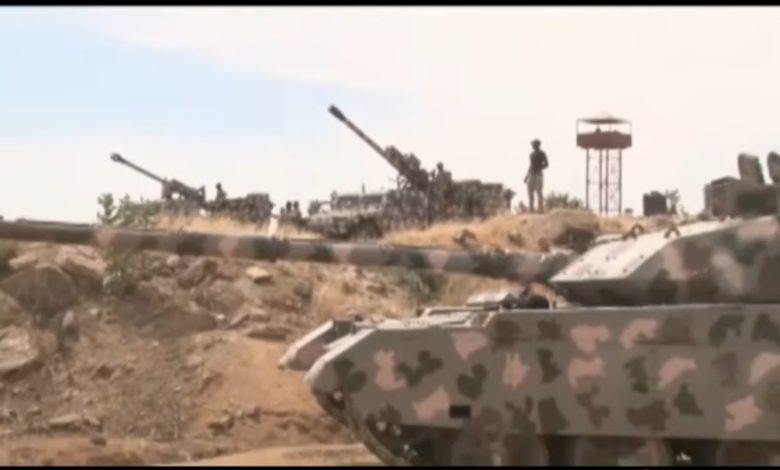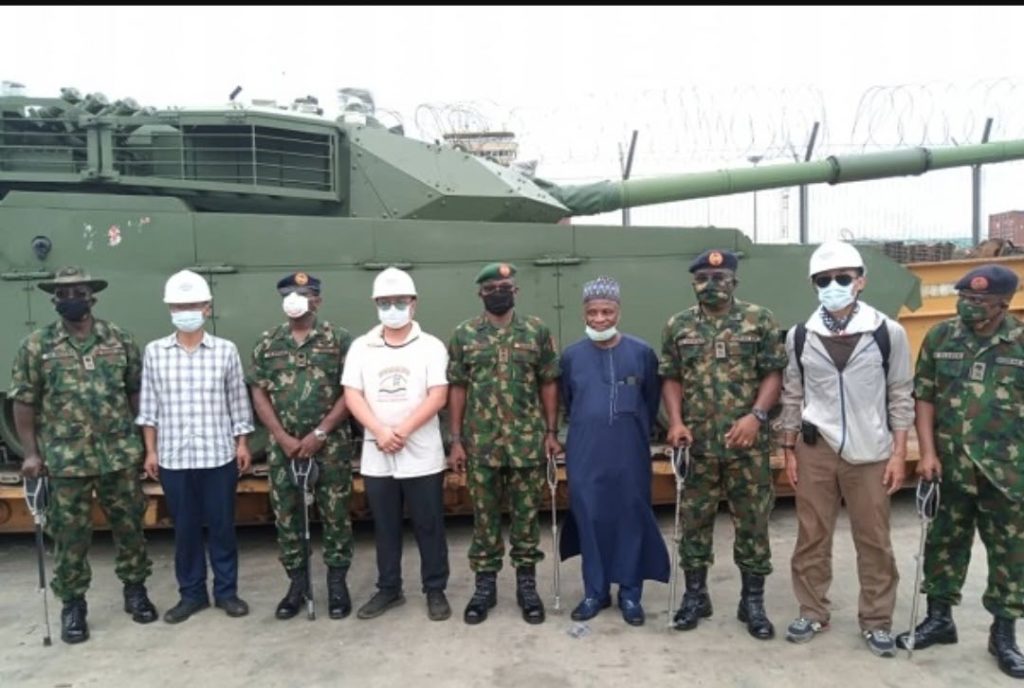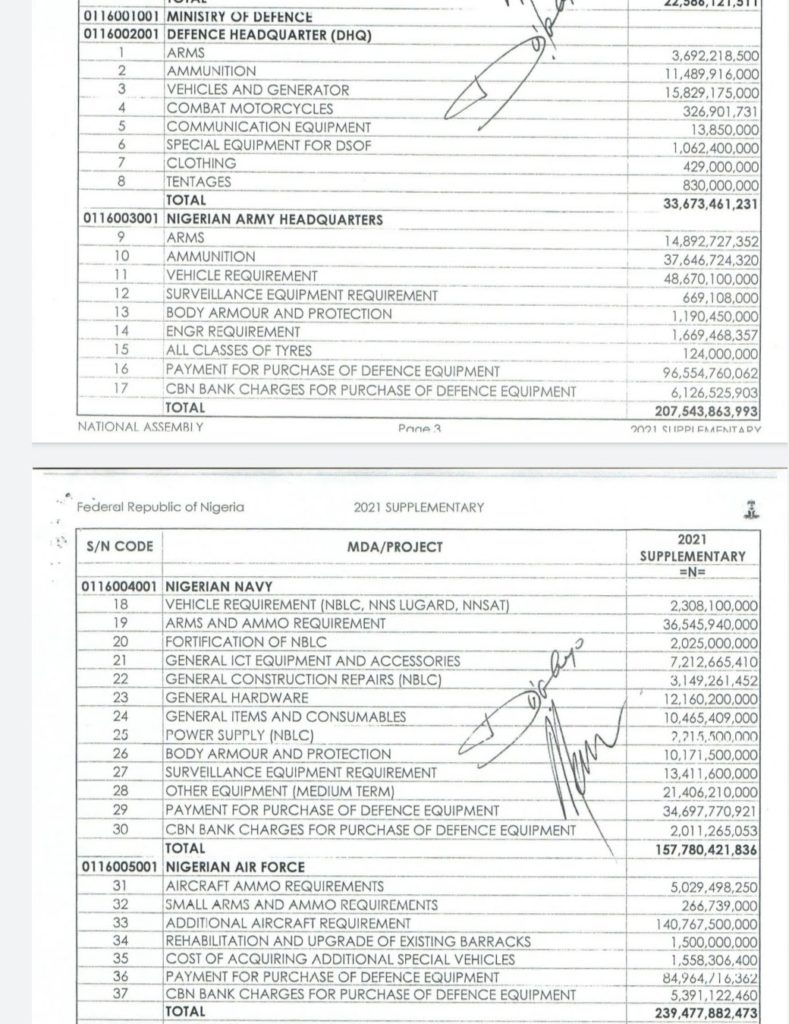Nigeria’s Opaque Military Budget Culture Increases Risks Of Corruption
Now more than ever, at a time of scarce resources and rising insecurity, Nigeria needs to block loopholes and strengthen transparency in the security sector budgeting process to maximise the use of public resources.

The Nigerian Military in the past few years has become a significant recipient of government funding, as authorities move to confront deteriorating security. However, transparency around budget and procurement remains a major issue.
The importance of transparency in the security sector budgeting process and the procurement of military hardware was highlighted by the arms scandal that ushered in the Muhammadu Buhari administration in 2015. The scandal involved former National Security Adviser (NSA) Sambo Dasuki and the misappropriation of funds allocated for the purchase of arms to combat insecurity.
Despite the incident, funding for military procurement has remained mostly blurry and characterised by the use of auxiliary budgets and generic descriptions that do not provide adequate information on the equipment, vendor, and value for taxpayers. There are few exceptions though, particularly involving foreign governments, such as the acquisition of the A-29 Tucano aircraft from the United States. Most of the details of the $593 million deal, however, came from the U.S. government through the arms sale notification published online.
In most cases, military acquisitions, especially those connected to the ground forces, become public knowledge from photographs and statements after they are delivered or during inductions of equipment ranging from soft skin pickup trucks to armoured fighting vehicles. This was the situation with the South Korean KIA KLTV-181 military tactical-utility vehicle as well as the NORINCO ST1 105mm fire support vehicle, SH 5 self-propelled howitzer, and VT-4 main battle tank from China.

Other examples include the sudden appearance of Isotrex Phantom II Armoured Personnel Carriers (APCs) at the frontline in early 2021 and subsequent delivery of Isotrex Legion Mine-Resistant Ambush Protected vehicles (MRAPs) from the United Arab Emirates-based company. In late August, a video appeared on Twitter, showing what appeared to be another newly delivered but unknown type of tracked armoured fighting vehicles belonging to the Army on flatbed trucks.
Even though the Air Force and Navy have often provided more details on vendors and equipment, the recent botched attempt to buy AH-1 attack helicopters from the U.S. was kept under the radar and away from the public until a Foreign Policy publication surfaced. The American news outlet had reported that top Democrats and Republicans on the Senate Foreign Relations Committee froze the authorisation for the proposed sale of the helicopters to the Nigerian military.
The revelation was swiftly followed by divergent statements from within the Nigerian Government, sending a disturbing message on the transparency of the arms procurement process. Nigeria’s Minister of Information and Culture, Lai Mohammed, for instance stated that the government was not aware of the arms deal with the U.S. while, shortly after, chairpersons of security committees at the National Assembly briefed the press about the prospect of meeting their U.S. counterparts to persuade them to rethink their decision.
Ahmed Vanderpuije, a Nigerian-Ghanaian arms broker and consultant who was photographed in April alongside army officers inspecting the Norinco equipment, was reported to have expressed plans to seize the opportunity created by the failed AH-1 deal to finalise the sale of Russian Mi-35 helicopters. In Jan. 2020, a source in the Federal Service of Military-Technical Cooperation informed Sputnik the remaining seven Mi-35M were ready for delivery to Nigeria, upon payment.
Authorities, in August, announced the contract to purchase 24 M-346 aircraft. This was about five months after information was leaked about a deal to procure the new twin-engine light attack for the Air Force, paving the way for the replacement of Alpha Jets as frontline fighters. The report had also exposed the involvement of an intermediary company in the deal.
The opaque nature of defence procurement and weak oversight of arms contracts were further brought to light when Babagana Monguno, the NSA and most senior security aide to the Nigerian President, lamented during a BBC Hausa interview in March, that the president had provided enormous funds but the equipment were not purchased. He then suggested the possibility of the President sanctioning an investigation.
In the interview, which was translated by TheCable, Monguno stated, “This is the reason why even though he brought in some new people (service chiefs), maybe they will devise an alternative method, and I am not saying that those former service chiefs that retired have embezzled the money. This is not what I meant but maybe the money has gone through another means that I don’t know and nobody else knows right now.”
The Office of National Security Adviser (ONSA) later backtracked on the statement and insinuated that NSA was quoted out of context. To also push back at the allegation of missing funds, Garba Shehu, a senior presidential media aide, claimed the interview was misconstrued, adding that no funds were missing but the military was facing challenges with the delivery of some equipment.
The drama continued with the emergence of more details on an earlier presidential directive withdrawing the approval for the NSA to buy arms worth $2.51 billion from UAE. This was after the late chief of staff, Abba Kyari, had observed anomalies in the contract signed in 2017 with the Abu Dhabi-based International Golden Group and a subsequent attempt to reinsert the firm in another equipment purchase. The Abu Dhabi company had been mentioned in a 2017 report on a profitable laundering scheme and in reports on arms transfer to UAE backed Libyan warlord General Khalifa Haftar.
In April, more details of military acquisitions through the $1 billion intervention funding approved in 2018 became public knowledge. They were likely connected to the NSA, with the document listing items including T-90 Tank, BREM-4 Armoured Recovery, Ground Surveillance Radar equipment, mortars, DSHK-M guns, Grad rockets, and AKMS rifles.
The $43.7 million deal for 10 T-90 tank was replaced with other items: 60 Legion ($475,587), 12.7mm DSHK HMG ($18,750), Codan Radios ($6,920), and Armoured Turrets ($29,631), 24 Phantom II APC ($385,209), 12.7mm DSHK AA Guns ($18,750), Codan ($6,920), and Turret ($29,631).
Despite these events, the military procurement in the supplementary budget approved by the parliament and signed by the President in July was full of brief lines such as additional aircraft requirement, payment for the purchase of defence equipment, and vehicle requirement. The budget items often did not provide further details covering the type of equipment, the single unit cost, vendors and after-sale support, and why such capabilities are important for national security.

These forms of acquisitions hinder standardisation and civil society scrutiny. They further encourage a pattern of purchase that resembles buying random items in the market, not an acquisition with strategic national planning behind it, thus exposing the procurement processes to corruption and the activities of arms dealers.
For example, in May 2019, arms dealer Ara Dolarian was arrested in the U.S. on suspicion of money laundering and illegally brokering the sale of arms and munitions to the Nigerian government. It was alleged that, in 2014, Dolarian executed sales contracts for the purchase and transfer of bombs, rockets, firearms, and aircraft-mounted cannons worth more than $8 million with the funds transferred by Nigeria through a purported furniture company in Hong Kong and numerous shell accounts held by Dolarian and others.
The lack of transparency in the security sector is not isolated to military expenditures. In March 2018, Matthew T. Page, a non-resident scholar at the Carnegie Endowment for International Peace, described the country’s ‘security votes’ culture as an opaque corruption-prone security funding mechanism provided to certain federal, state, and local g-overnment officials to disburse at their discretion.
In a series of tweets in May, BudgIT, a Nigerian non-profit promoting transparency and accountability in budgeting, spotlighted the issues surrounding the security votes culture and poor auditing of security budgets, stating that “increased resources allocated to the security sector means that less money is available to develop other sectors; thus, there is a need for more scrutiny of how these allocations are budgeted and spent.”
Improving transparency in the security sector budgeting and procurement process will cut down waste. It will also enhance badly needed accountability and the efficient use of public resources, particularly at a time of dwindling revenues and increasing insecurity.
Support Our Journalism
There are millions of ordinary people affected by conflict in Africa whose stories are missing in the mainstream media. HumAngle is determined to tell those challenging and under-reported stories, hoping that the people impacted by these conflicts will find the safety and security they deserve.
To ensure that we continue to provide public service coverage, we have a small favour to ask you. We want you to be part of our journalistic endeavour by contributing a token to us.
Your donation will further promote a robust, free, and independent media.
Donate HereStay Closer To The Stories That Matter




